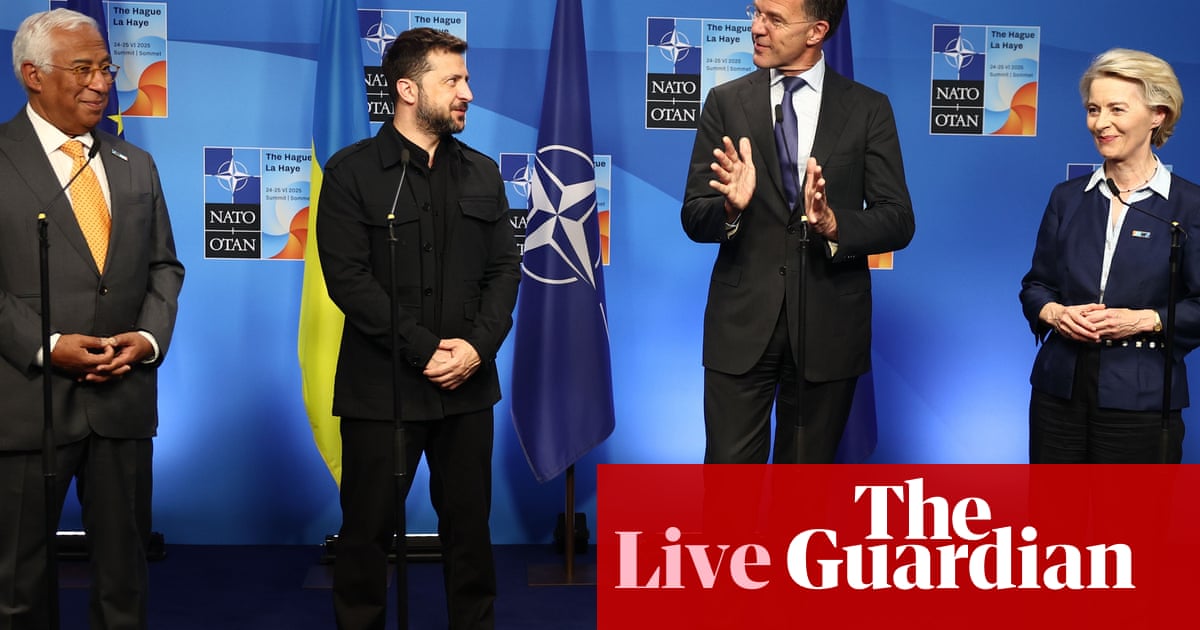After yesterday’s Nato summit inThe Hague,European leaders have travelled 176 km south to Brussels (1 hour 36 minutes on a train, but with connection in Rotterdam) where they meet for today’sEuropean Councilmeeting of the EU.
On the agenda:
Ukraine(including a video call withVolodymyr Zelenskyy),
theMiddle East,
European defenceand security,
competitiveness, and
migration.
They will also discuss the situation inMoldovaand the broader enlargement policy towards thewestern Balkans.
The leaders should start arriving any moment now, and I will bring you their comments as they go into the room where it happens.
It’sThursday, 26 June 2025, it’sJakub Krupahere, and this isEurope Live.
Good morning.
Dutch prime ministerDick Schoofarrives next, fresh from the successful Nato summit in The Hague.
He (not surprisingly) says it was a“very good summit,”which “achieved a big result” with the new 5% defence spending target.
He also tells reporters it’s clear that the US remains committed to Nato and Article 5, and hopes for a resolution to trade issues soon.
Onsanctionsagainst Russia, Schoofbacks the “strong” package and says he is “hopeful”thatit will be passedduring today’s meeting.
Hungary’sViktor Orbánis the first leader to arrive.
One of the key issues at this summit is whether the leaders will be able toagree on the 18th package of sanctions against Russia.
Hungary has been a vocal critic of the proposal, threatening (as usual) to block it. Slovakia is also partially against the new package.
But in his exchange with the Hungarian media, Orbán appears to signalhe received a good compromise offerfrom the EU’s foreign policy chief, Kaja Kallas. One to watch.
He then takes a few questions from international reporters.
He gets asked what he would do if one of his five children wanted to attend theBudapest Pridemarch this weekend, banned by the Hungarian police.
He says:
They are all adults. So, they make their own choices in their own lives.
OnUkraine, he says he worries that “if we integrate Ukraine into theEuropean Union, we would integrate the war.”
“We would not like it to be together in one community with a country that is at war and represents an imminent danger for us. If a member of the EU is at war, it means the EU is at war, and we don’t like it.”
He gets asked if his calculation would change if there was a ceasefire.
“Yeah, but there’s no ceasefire,” he answers.
OnEU-US trade, he says the problem isthe Americans have “a heavyweight dealmaker,”whilethe EU’s negotiators are “rather weak.”
Onmigration, he calls for“rebellion, rebellion, rebellion”against the EU’s rules as he criticises the inadequate response so far.
“We have discussed 100 times how to change … the regulation of migration. And nothing happened, they just [keep] coming in,” he says.
He tells his fellow leaders that “if you come together to have a nice meeting and nice talk, it will never ork.”
“The only way to stop it, as we Hungarians have done, … that nobody can step into the territory of Hungary without having the permission from the Hungarian authorities,” he says.
“What I suggest to all my colleagues, rebellion, rebellion, rebellion. …Rebellion is the only way,” he says.
After yesterday’s Nato summit inThe Hague,European leaders have travelled 176 km south to Brussels (1 hour 36 minutes on a train, but with connection in Rotterdam) where they meet for today’sEuropean Councilmeeting of the EU.
On the agenda:
Ukraine(including a video call withVolodymyr Zelenskyy),
theMiddle East,
European defenceand security,
competitiveness, and
migration.
They will also discuss the situation inMoldovaand the broader enlargement policy towards thewestern Balkans.
The leaders should start arriving any moment now, and I will bring you their comments as they go into the room where it happens.
It’sThursday, 26 June 2025, it’sJakub Krupahere, and this isEurope Live.
Good morning.
